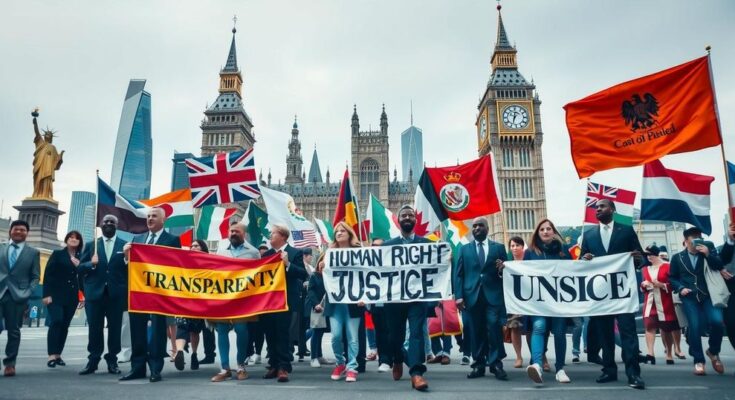Western nations are pushing China to allow independent observers into Xinjiang and Tibet, calling for the release of detained Uyghurs and Tibetans. During a U.N. session, Australian Ambassador James Larsen spoke for a coalition of countries, indicating serious human rights concerns and China’s failure to respond adequately. China, however, refutes the claims, accusing the West of using human rights as a political weapon.
A coalition of Western nations urged China on Tuesday to release all detained Uyghur Muslims and Tibetans and to permit independent human rights observers access to critical regions. During a U.N. General Assembly human rights meeting, Australian Ambassador James Larsen emphasized the necessity of transparency, stating, “Transparency and openness are key to allaying concerns.” His address represented the collective stance of 15 nations, including prominent countries such as the U.S., Canada, Germany, and Japan. Xinjiang, located in northwestern China, is home to the Uyghur minority and has become synonymous with allegations of significant human rights abuses. Reports suggest Beijing has detained roughly one million Uyghur Muslims in so-called reeducation facilities. Furthermore, there has been an evident suppression of freedoms in Tibetan areas, noted Larsen. Larsen referenced serious concerns raised by multiple U.N. experts about the mass arbitrary detention, forced disappearances, and labor exploitation happening in Xinjiang. He pointedly remarked that China had numerous opportunities to address these critical human rights inquiries but instead dismissed concerns as “illegal and void.” This dismissal came during their Universal Periodic Review in July.
The situation in Xinjiang and Tibet reflects a broader context of human rights tensions between China and the Western world. The Uyghurs, a predominantly Muslim ethnic group, face extensive government crackdowns, which have led to accusations of genocide from several nations, including the U.S. In Tibet, cultural and political repression has similarly raised alarms over the erosion of local rights. Recently, U.N. discussions have shed light on these regions, calling for accountability and transparency from China.
In conclusion, the ongoing human rights crisis in Xinjiang and Tibet has drawn significant scrutiny from Western nations, which are demanding transparency and access for international observers. While China dismisses these allegations, claiming they are part of a Western agenda, the call for the release of detainees and an end to abuses highlights the need for global vigilance in protecting human rights.
Original Source: www.voanews.com



